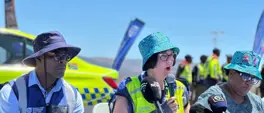Increase in sewage at Cape Town beaches pose serious health risks, warns epidemiologist
Carlo Petersen
28 October 2024 | 4:49An epidemiologist explained that the high E-coli levels in the water poses serious health risks while also damaging the ecology of the sea.
CAPE TOWN - An epidemiologist has warned that an increase in sewage at beaches along Cape Town's coastline could pose serious health risks.
Senior lecturer at Stellenbosch University’s department of global health, Doctor Jo Barnes said sewage intrusion into the ocean around Cape Town has alarmingly increased.
Barnes said she joined a team of health and water quality experts to test Cape Town's rivers and beaches recently.
"Most of the rivers entering the sea from various points in the peninsula are heavily polluted, particularly with sewage," she said.
Barnes said the sea was also polluted by stormwater contaminated by leaking sewers and overflowing wastewater treatment works.
"The city also has a number of what they call marine outfalls, where untreated sewage only passed through a sieve is actually released into the ocean as well," she added.
Barnes explained that the high E-coli levels in the water posed serious health risks while also damaging the ecology of the sea.
Barnes said that her team recently tested the water quality of the Disa River in Hout Bay.
"The Disa River is also severely impacted. It's entire length, there are pollutants present, but particularly below the settlement of Imizamo Yethu," she said.
Barnes said her team was shocked by the results of their tests on the river's water quality.
"I recorded more than 8 million E-coli organisms per hundred milliliters of water. That is a serious indication of the presence of sewage. The standard for South Africa for exposure to such water is 500 organisms."
The City of Cape Town has assured the public that most beaches in the metro show excellent water quality during the peak summer season.
City coastal manager, Greg Oloefse, said coastal water quality can, however, be influenced if there's a sewerage pipe burst.
"But once that's fixed, it goes on and we therefore expect through the summer period at most of the recreational nodes that there shouldn't be any concern around coastal water quality," Oloefse said
Barnes said the city should be doing more to curb water pollution.
"We are very concerned about the service delivery problems that will escalate the health problems and damage the tourism industry," she said.
'VERY POLLUTED'
Former National Sea Rescue Institute (NSRI) CEO, Doctor Cleeve Robertson, said that beaches situated close to Cape Town's four marine outfalls were "very polluted".
Robertson said that the sewage outfalls in Hout Bay, Llandudno, Green Point and Camps Bay were causing pollution at beaches near the sewage outfalls.
"If you go to Camps Bay in the afternoon and you drive down Kloofnek, if you look at Maiden's Cove corner, you will see a grey slick of sewage that runs inshore onto Glen Beach, across Camps Bay beach, and into the far corner. The slick is much more prevalent than it used to be," Robertson said.
Robertson said the city had a duty to ensure the water at its beaches were clean.
"The city said they test the E-coli counts, but the E-coli is the only thing they count. What about viruses? What about other bacteria? What about chemicals? What about hormones? What about pharmaceuticals? They say the water's clean, well the water's not clean," Robertson said.
The city said its tests showed that water quality at beaches was usually better in summer compared to winter.
Oloefse said that data over decades of monitoring coastal water quality showed most beaches had excellent water quality during the peak of summer.
Oloefse said beachgoers who visited the coast this summer should consider the following:
"If there's a large urban river that discharges into the sea nearby, and examples of that could be the Disa River in Hout Bay, where these rivers come into the sea, they're often carrying high levels of pollutants and we would recommend to people not to swim in an area where the river joins the sea," Oloefse said.
Oloefse advised beachgoers to swim about 150 metres either side of a river mouth.
"Secondly, people should be aware that once there's been a high rainfall event, the rainfall flushes the catchments and we see a decline in water quality generally after a rainfall event as all of the pollutants are washed out of the catchments down the rivers and stormwater drains into our sea," he said.
Oloefse said it's advisable not to swim in the ocean for 24 hours after heavy rainfall.
"The third thing that we always advise people, particularly in summer, if you go to your beach of choice or your tidal pool of choice and you see a stormwater drain discharging water into the environment, you should consider swimming further away from that stormwater drain," he said.
Oloefse said stormwater drains should not be running if there hadn't been recent rainfall.
'INAPPROPRIATE HUMAN BEHAVIOR'
City Mayco member for water and sanitation, Zahid Badroodien said that maintaining the quality of waterways that runs through urban spaces, informal communities, and areas of great densification was not unique to Cape Town.
"In our city, we experience a number of challenges that particularly exacerbate the impact on our waterways, such as inappropriate human behavior, dumping of foreign matter and foreign waste in our waterways and canals that ultimately has an impact on the quality of water," Badroodien said.
Badroodien said the city aimed to reduce sewer pollution by replacing at least 100 kilometres of sewer pipes annually, and by upgrading pump stations.
"This in addition to the multi-billion rand investments the city is currently undertaking at wastewater treatment plants such as Zandvliet, which we have just recently concluded, and the R5.5 billion project at Potsdam which is currently underway," Badroodien said.
Badroodien said the city was undertaking an extensive multi-billion rand, multi-year programme to invest in infrastructure and establishing catchment management forums for people to take ownership of eco-systems.
"Hopefully, over time, we will see an impactful and meaningful difference in our waterways that are particularly impacted, such as the Disa River and the Soet River, which is currently receiving a lot of attention by the city," he said.
Badroodien said the city also had an education component to educate residents about the impact of their behaviour on the environment.
Get the whole picture 💡
Take a look at the topic timeline for all related articles.












